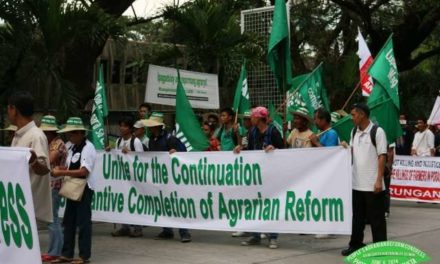Pasay City, Philippines – Around 200 rice farmers, farmworkers, rural youth and women from various national and local organizations held a protest at the gates of Senate to oppose the approval of SB 1998 or the Rice Tariffication Bill scheduled for deliberation at the Bicameral Committee meeting today. The said bill aims to replace the Quantitative Import Restrictions (QR) under the World Trade Organization (WTO), and will subject the entire country under a liberalized rice trade regime—allowing the open and free entry of rice from other countries. The Kolektiba ng Magsasaka Laban sa Importasyon (Farmer’s Collective Against Importation),warned about the possible impact of cheap imported rice to the survival of the small farmers.
“The rationale behind this bill is not so much about making the local rice industry competitive, but to simply reduce rice prices in markets, a palliative solution to the recent crisis” said Nestor Diego, a farmer leader from Nueva Ecija. The 2017 rice supply data shows that the country is self-sufficient, with a rice requirement of 12.6 million metric tons against a nationwide production of 12.5 million metric tons. “We have the capacity to feed the nation and we have the potential to produce more. But with most farmers remaining in struggle against rural poverty, landlessness and the lack of government support, we simply cannot compete in a tariff based regime”, Diego adds.
When it comes to rice importation, Vietnam and Thailand are the Philippines’ major sources of the staple. With a production cost per kilo rice of roughly PhP 6.00 in Vietnam and PhP 8.00 in Thailand, the Philippines’ production cost of PhP 12.50 per kilo cannot compete. “Even with a 35% tariff rate, according to PhilRice, imported rice from Vietnam is about 21% cheaper than domestic rice”. With this, any rice production gains the Philippines had in the past years will be negated by tariffication, with inadequate state support such as subsidies, credit and infrastructure.
“It appears that rice tariffication is in the works only to influence domestic prices”, lamented Romeo Royandoyan of Centro Saka. A knee jerk reaction in the aftermath of the rice crisis during the interim months of 2018. “The go-to solution to the issues on rice availability and accessibility will always be importation, if our current economic managers had their way”, Royandoyan added.
The tariff rate proposed under SB 1998 is at 50% with revenues going straight to a permanent Rice Fund, based on a statement from the Office of Senator Cynthia Villar, the bill’s sponsor. Farmers like Diego on the other hand, say that “this is not enough to encourage competitiveness, especially with the historical ineffectiveness of production support programs to promote inclusive growth in the sector”.
The said bill also contemplates to abolish the National Food Authority (NFA) by reducing its functions to direct rice importations and procuring rice directly from local farmers.. “Though faced with allegations of corruption and inefficiency, weakening the NFA would place rice importation in the hands of traders, importers and even corporations who will flood markets with supply. This will create a scenario where more farmers will disengage from agriculture due to poor incomes.” says Trinidad Domingo of the National Rural Women Coalition.
The buying price of NFA under the bill is set at P17 per kilogram. This is way below the 25-peso palay support price that the agency proposed in May 2018 to increase its capacity to purchase rice from local farmers. With its present buying price, the NFA would inevitably be unable to procure sufficient stocks of rice, thus further weakening the agency.
In sum, the group says that “If importation becomes the main policy track in attaining food security, a feared outcome might be the alarming reduction of local rice production, where sizeable amounts of rice lands will be primed for land conversion or vulnerable to land grabbing”. The group also points out that Villars’ sponsorship of the said bill is highly questionable, due to her family’s ownership of Vista Land, a large and well-known property developer. “Policies concerning agriculture should protect small farmers first, rather than promote the interests of corporations”, the group pronounced in a call for recognition, possibly unheard from within the Senate’s halls.
According to the Food and Agricultural Organization, 70% of the food that people consume globally comes from small farmers—a statement that criticizes the trend of increasing corporate control and dwindling public investments and state protection on small-holder agriculture around the world. ■















